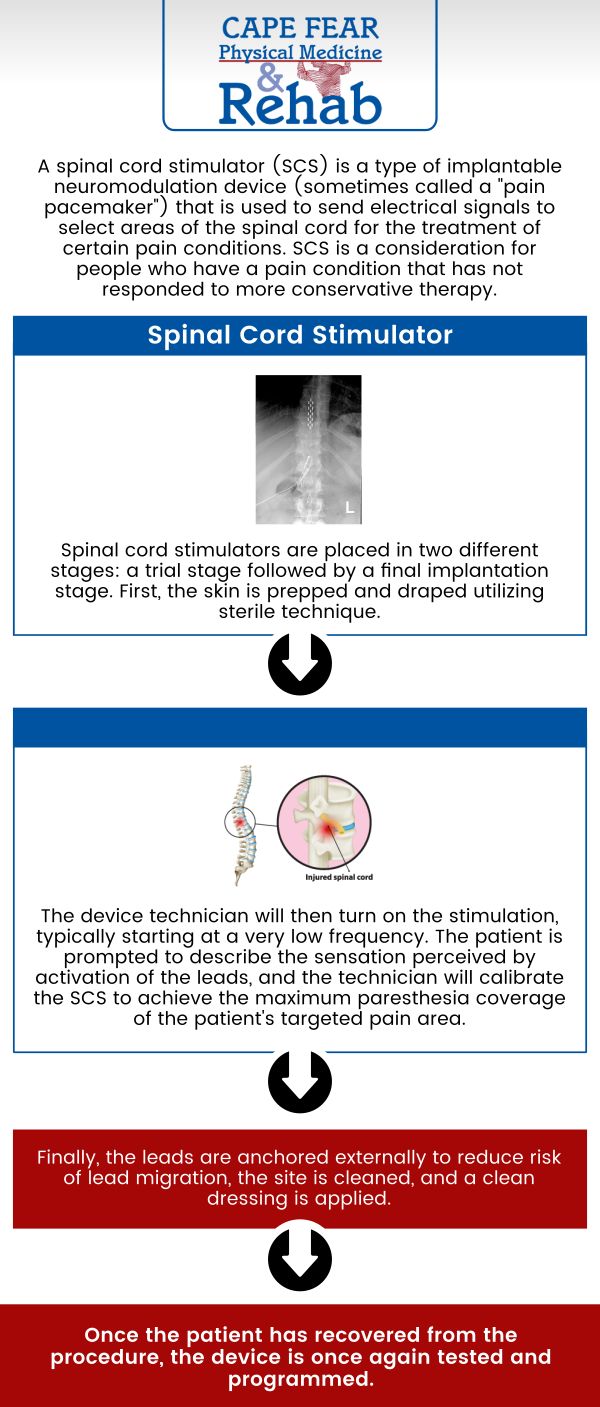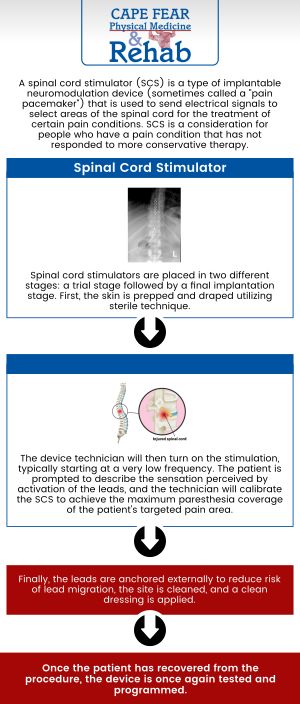Spinal Cord Injury Rehab in Fayetteville NC
Spinal cord injuries can significantly impact mobility and daily functioning, but with the right rehabilitation, recovery is possible. At Cape Fear Physical Medicine and Rehab, we offer specialized spinal cord injury rehab to help patients regain independence and improve their quality of life. Our professional team tailors rehabilitation plans to address the unique needs of each patient, focusing on strength, mobility, and overall well-being. Through comprehensive therapy and support, we strive to help individuals reach their highest potential for recovery. Contact us today for more information or book an appointment online. We are conveniently located at 1540 Purdue Dr, Ste. 200 Fayetteville, NC 28303.




Table of Contents:
What is a spinal cord injury?
What happens if the spinal cord is injured?
What is the most common spinal cord injury?
What are the symptoms of a spinal cord injury?
Can you recover from a spinal cord injury?
A spinal cord injury often causes lasting changes in strength, sensation, and other body functions below the area of the injury. If you’ve recently damaged your spinal cord, it might seem like every facet of your life has been affected. A spinal cord injury is life-altering but today’s technology can help with rehabilitation. New treatments and rehabilitation allow many people to lead independent lives.
A spinal cord injury (SCI) is when the spinal cord has been damaged and it results in the loss of function, such as feeling and/or mobility. The majority of causes of spinal cord injuries are from trauma (auto accidents, gunshots, falls, etc.) or degeneration and diseases such as polio and spina bifida.
Contrary to what some people have been led to believe, the spinal cord doesn’t need to be severed for the loss of mobility to occur. The majority of people that have experienced spinal cord injuries have their spinal cord intact but the damage results in loss of function and mobility.
Spinal cord injury is extremely different from back injuries, such as pinched nerves, ruptured discs, and spinal stenosis.
The spinal cord does not have to be separated for a loss of function to occur. In fact, in most people with an SCI, the cord is intact, but the impairment to it results in loss of function.
When the spinal cord is damaged or injured, the nerves in the body can’t communicate with the brain. A spinal cord that has experienced trauma can affect:
• Bladder function
• Bowel (intestinal) function
• Breathing
• Heart rate
• Metabolism (the body’s process of converting food into energy)
• Muscle movement
• Reflexes
• Sensations
When it comes to the kinds of spinal cord injuries (SCIs) that a person can withstand, there is a wide range of injuries and levels of severity to understand. Any SCI causes damage to the spinal cord thereby impeding the transmission of information between the brain and the rest of the body.
Spinal cord injuries are most often broken down into two categories:
Incomplete and complete spinal cord injuries
A spinal cord injury accident can result in SCIs that range in severity, although a complete SCI is usually more devastating than an incomplete SCI.
Incomplete Spinal Cord Injuries
The National Spinal Cord Injury Statistical Center states that the two most common types of spinal cord injuries are incomplete tetraplegia and paraplegia which account for more than 65% of all spinal cord injuries.
This injury partially inhibits the spinal cord and can be caused by a spinal cord contusion, a partial severance of the spinal cord, or having something pressing against the spinal cord, such as bone fragments or foreign bodies affecting it. These sorts of incomplete spinal cord injuries result in diminished sensory or motor functions below the injury site on the spinal cord; however, SCI survivors with these types of spinal cord injuries may recuperate some function over time contingent on their health and medical history.
Complete Spinal Cord Injuries
A complete spinal cord injury is that which causes long-lasting impairment to the affected area of the spinal cord. Complete types of spinal cord injuries are signified by a complete lack of motor and sensory functions below the injury locations on the spinal cord. Complete tetraplegia (quadriplegia) and paraplegia account for less than 35% of spinal cord injuries — and, as medical technology advances, research and treatment improve, this number continues to decline.
There are several signs and symptoms of spinal cord injuries:
• Loss of movement/mobility
• Loss of sensation, including the ability to feel touch, cold or heat
• Loss of bowel or bladder control
• Exaggerated reflex activities or spasms
• Changes in sexual function, sexual sensitivity
• Pain or an intense stinging sensation caused by injury to the nerves in your spinal cord
• Difficulty breathing or coughing/clearing secretions from your lungs
Recovery is dependent on the severity of the damage to the spinal cord as it’s been shown that incomplete SCIs have a better chance of recovery. Research for a cure for SCI is promising, but there is no way to fully restore function following SCI.
At Cape Fear Physical Medicine and Rehab, our skilled team are dedicated to helping patients with spinal cord injuries regain mobility and improve their quality of life. Our personalized rehabilitation programs are designed to address each patient’s unique needs and support their recovery journey. Contact us today or schedule an appointment to learn more about our services and how we can help you take the next step toward recovery. We are conveniently located at 1540 Purdue Dr, Ste. 200 Fayetteville, NC 28303. We serve patients from Fayetteville NC, Woodfield NC, Hope Mills NC, Fort Bragg NC, Eastover NC, and surrounding areas.

Additional Services You May Like
▸ Weight Loss & Wellness Program
▸ Botox for Migraine
▸ EMG Nerve Conduction Studies
▸ Epidural Steroid Injections
▸ Radiofrequency Ablation
▸ Rehabilitation Consultations
▸ Facet Injections
▸ Sacroiliac Joint Injections
▸ Joint Injections
▸ Genicular Nerve Blocks
▸ Prosthetic Evaluation/Management
▸ Adjuvant Therapy/Care
▸ Spasticity Management
▸ Stroke Treatment
▸ Multiple Sclerosis
▸ Spinal Cord Injury
▸ Traumatic Brain Injury
▸ Lifestyle Medicine
▸ Phentermine
▸ Qsymia
▸ Contrave

Additional Services You May Like
▸ Weight Loss & Wellness Program
▸ Botox for Migraine
▸ EMG Nerve Conduction Studies
▸ Epidural Steroid Injections
▸ Radiofrequency Ablation
▸ Rehabilitation Consultations
▸ Facet Injections
▸ Sacroiliac Joint Injections
▸ Joint Injections
▸ Genicular Nerve Blocks
▸ Prosthetic Evaluation/Management
▸ Adjuvant Therapy/Care
▸ Spasticity Management
▸ Stroke Treatment
▸ Multiple Sclerosis
▸ Spinal Cord Injury
▸ Traumatic Brain Injury
▸ Lifestyle Medicine
▸ Phentermine
▸ Qsymia
▸ Contrave







